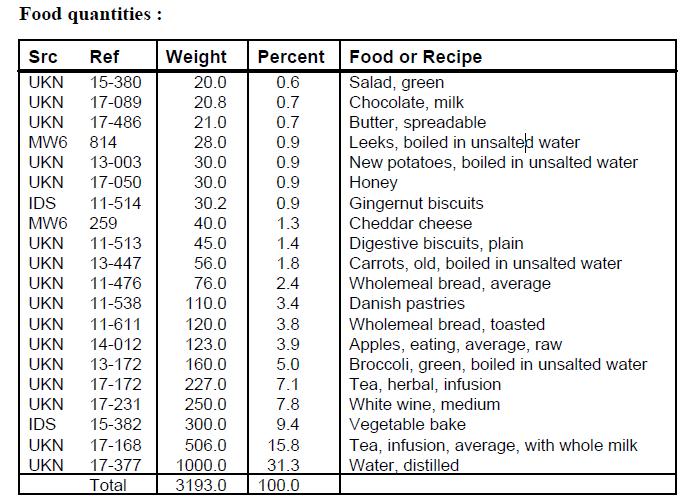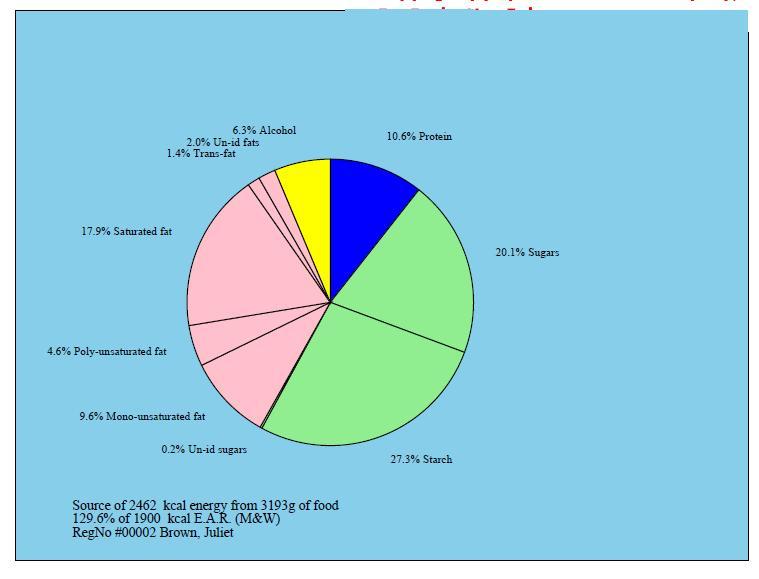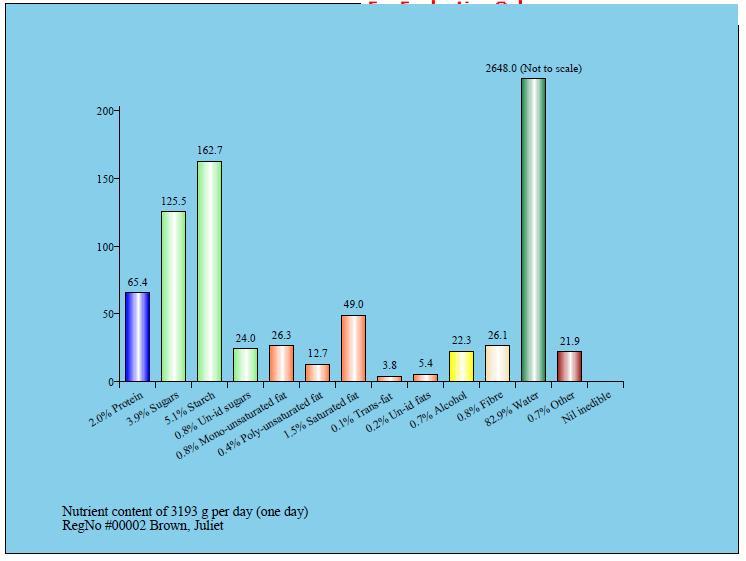Introduction
The well known philosopher Hippocrates once stated that, “Let thy food be thy medicine and thy medicine be thy food (McGuire & Beerman 2009, p. 3).” Based on this statement one can observe that food plays a very important role in our lives. It is a fact that life is not possible in the absence of nourishment. This is indicated by the fact that the quality of life we lead is greatly influenced by the food we consume (McGuire & Beerman 2009). In this regard nutrition science plays a major role in our lives as it contributes to good health.
Juliet Brown, the subject of this report is a 55-year-old lady who has a job that involves 8 hours of office work on a daily basis. The purpose of this report is to present findings of an individual nutritional assessment with a view to determining the appropriateness of subject’s nutritional intake. For this analysis Juliet made use of the 24-hour recall method to collect data on nutritional intake (Rolfes, Pinna & Whitney 2008).
Juliet has been over weight through for the greater part of adult life. However, there has been a significant increase in body weight since menopause which began at the age of 50. In addition to that Juliet’s routine leaves little time for exercise and as a result the only exercise received is walks around shops once a week. Most of her free time is spent watching TV as she feels too tired to engage in any other activity. Juliet is divorced and has no children.
To control food intake Juliet uses a food diary and normally has five meals on a daily basis. The meals include breakfast, a mid morning snack, lunch, supper and a snack before bedtime. Her father died aged 65 from a heart attack. Her mother is currently suffering from dementia and is aged 86 years old. Juliet’s brother currently resides in Australia though the two are not very close. She has never been a smoker though she enjoys a glass of wine whenever eating out. She visits the cinema once a week and treats herself thrice a week by eating out.
Juliet has had no serious medical issues throughout her life and feels generally healthy. It is reported that she experienced slight issues during menopause at 50 and currently does not experience any known medical problem. Juliet has never had a pregnancy or miscarriage. However, the nature of her work involves long hours seated in front of a computer and as such she experiences occasional neck and back pains.
Other than that, Juliet experiences occasional joint pains and normally catches cold once a year during winter. Juliet’s main medical complaint is heartburn which is experienced several times a week. She reports that the heartburn is often worse after a large meal or when experiencing stress. In addition to that she also experiences occasional flatulence and bloating. On occasion she has problems with stool and is affected by an itch around the anus on some nights. Due to being overweight she reports feeling of tired frequently. Juliet does not use any medical supplements except for the occasional Boots Multivitamin.
Method of Assessment
To complete the task of nutritional assessment this report selected the 24-hour recall method over other methods such as Food Frequency Questionnaires (FFQ) and a Food Record. Though FFQ’s are considered relatively cheap, the method is reported to be best suited to gather data in relation to long term intake (Duggan, Watkins & Walker 2008). For this reason, the method was deemed inappropriate for this analysis. It should be noted that the purpose of this analysis is to gain nutritional advice that will allow the subject shed some weight prior to a school reunion.
The 24-hour recall method is fairly suitable for subjects whose diet is fairly consistent and as such it appears well suited for this case. The 24-hour recall method is based on an interview with the subject (Duggan, Watkins & Walker 2008). The advantages of the method include the fact that it is inexpensive, quick, has low burden and is flexible. The method also bears the disadvantage that variation in diet is not likely to be captured (Duggan, Watkins & Walker 2008). The method is also at times inaccurate due to the biases in memory contribute to the subject’s diet. The method may also be inappropriate due to tendency to attempt to please the interviewer. In addition to this analysis was carried out using the Dietplan6 software too. This is a comprehensive and inexpensive tool that can be used to provide high quality nutrition analysis (Dietplan6 2012).
On the other hand, a Food Record consists of a detailed diary of foods consumed over one or more days. The method is thought to be reliable given that food data is recorded at the time of consumption and thus prevents forgetfulness (Duggan, Watkins & Walker 2008). For this reason, the approach is considered to be fairly accurate on most occasions. One disadvantage of the method is that it may not be precise when dining out. For this reason, this method was found unsuitable owing to the fact that the subject regularly dines out.
Results
In this section the results of the subject’s data are presented. The first table includes initial anthropometric results which include height, weight, body mass index (BMI) and waist to hip ratio. The second table is a summary of the subject’s daily sources of energy. This is followed by a table that differentiates the nutritional values of different foods that contribute to daily intake in a table. This is followed by a pie chart that illustrates the percentage each food consumed makes to the daily intake. There is also a graph indicating the nutrient contribution by weight.
Table 1: Calculated Anthropometric data.




Analysis
Upon analyzing the data related to the subject it becomes apparent that her daily intake needs to be reduced from 2462 kcal to 1940 kcal (Weightlossresources n.d.). It has also been established upon observation of Juliet’s macro nutrient intake of carbohydrate, protein and fats is imbalanced as indicated in Figure 1 and should be as indicated in Figure 2. The charts indicate Juliet requires 8.6% more of carbohydrates, 2.6% more of protein and 5.7% less of fats. A comparison of daily recommended allowance of protein indicates Juliet is consuming less than she is supposed to consume. His appears to arise due to the fact that she consumes insufficient quantities or skips meals. This in turn results in decreased basal metabolic rate and increases blood sugar imbalances hence chocolate cravings.
In addition to that Juliet needs to know that coffee and tea contain tannin which blocks absorption of essential minerals (Ellis 2010). As a result of this may possibly affect her bones and may contribute to her occasional neck and back pains. It has also been observed that her frequent heartburn may be the result of an acidic diet.
She mentions the consumption of cake and biscuits which contain sugar and are as such very acidic (Waxman & Kushi 2007). The abdominal bloating and flatulence appear to be due to lack of enzymes and pro bacteria (Hare 2006). Her problem of dry skin is possibly the result of dehydration due to daily consumption of tea, coffee (Waxman & Kushi 2007). In addition to that she should note that alcohol is a stimulant and diuretic that causes the loss of potassium (Whitney, Whitney & Rolfes 2010). Lastly it was observed that her protein intake was low and her diet included no essential fatty acids.
Advice
Based on the findings after an analysis of the patient there are several points of advice that can be suggested to improve the patient’s health. In relation to heartburn it has been observed that the consumption of more foods like vegetables could help reduce the problem (Page 2005). In addition to that it has been suggested that Julie should chew food well and eat regularly in moderate amounts. It is also suggested that she should avoid large meals and eating late at night. It is also recommended that while sleeping she should lie on her left side and make an effort to lose weight. In addition to that it is recommended that she increase her intake of fiber and water at the first sign of discomfort but not while eating (Page 2005). She can also try to eat Aloe Vera, fennel seeds, wheat and barley grass that will support her esophagus and stomach.
In relation to the problem of irregular stool it is recommended that she consume more fiber. In response to the problem of abdominal bloating and flatulence it is recommended that she use digestive enzymes such as HCL and Digestizime (Digestizime 2012). These products provide a broad spectrum of plant sourced enzymes which are useful in digestion of protein, carbohydrates and fat. It is also recommended that she use probioguard to assist in reduction of refined carbohydrates for digestion. Probioguard is known to contain four carefully selected strains of friendly bacteria namely, lactobacillus, acidophilus, bifid bacterium, streptococcus, thermophilus, and lactobacillus delbrueckii ssp bulgaris, which have been widely used in clinical studies (Probioguard n.d.).
In relation to diet it is recommended that Juliet increase her intake of oily fish, hemp oil, flax seeds, nuts, seeds, avocado and olive oil. It is also essential she increases intake of anti oxidants such as fresh berries, cherries, green tea, turmeric, ginger and garlic (Chhajer 2006). In addition to that it is suggested that Juliet decrease her intake of inflammatory foods such as wheat, refined carbohydrates, dairy products and processed foods. In addition to that it suggested that Juliet makes some lifestyle changes to include physical activity that will help her lose weight (Vaidya 2006). In this regard it has been suggested that she begin to undertake activities such as exercise and yoga.
In light of her situation it may also be worth considering taking some food supplements such as 1 tablet of Eskimo fish oil daily. This is likely to reduce inflammation by stimulation of anti inflammatory mediators. These oils also improve cellular communication and increase cell membrane integrity.
It is important for Juliet to realize that in order to ensure she is getting enough protein, it is very essential to combine proteins effectively (Kraemer, Fleck & Deschenes 2011). For this reason good quality protein should be eaten with every meal and snack to avoid protein deficiency. The following combinations of food do not have to be consumed at the same time, but it is advisable to do so most of the time.
- Rice and grains with nuts, seeds, legumes, lentils, peas e.g. rice and beans or sprout and amaranth salad.
- Legumes in combination with seeds or nuts e.g. hummus
- Soy with grain e.g. smoked tofu on rye bread or soy milk porridge or buckwheat noodle tofu stir fried.
- Grains and dairy products e.g. boiled eggs on whole meal toast, poached egg on brown rice pilaf
Some good sources of vegetarian protein that Juliet should consider include:-
- Beans, lentils and legume (best consumed in combination with grains such as brown rice)
- Quinoa (a complete protein source)
- Tofu, soy milk and fermented soy products such as tempeh and miso.
- Eggs (a complete protein).
- Nuts and seeds
- Peas
- Organic dairy products (a complete protein source).
- Sprouted beans, nuts, seeds and grains.
In addition to the above dietary advice it is essential for Juliet to note that obesity is a major growing concern. Her BMI analysis indicates that in addition to the above mentioned problems she is also obese. In the treatment of this condition it has been observed that individuals must be self motivated and amendable to change in order to achieve success with their weight loss goals (Vaidya 2006). This position suggests that for Juliet to lose the desired weight she must make a firm commitment to the regimen prescribed if she is to make any significant progress. There are several additional strategies which she can prescribe to alter the situation including dieting, exercise, behavior modification, pharmacotherapy and surgery (Vaidya 2006).
Juliet has also added that she is in the habit of having a late night snack. A late night snack is a common habit for many after having dinner early in the evening and feeling hungry again after a couple of hours spent watching television. Although it is myth that eating late it bad for your health, the reality is it’s not so much eating but what you eat (Lluch 2010). So to avoid problems if Juliet has to eat at all at night she should try eating something healthy such as fruit. It is reported late eating is a normal cause of sleeping disruptions for many people and can cause health problems. In addition to that Juliet suffers regular heartburn and eating and lying down shortly after is known to worsen heartburn or acid reflux in individuals prone to such issues (Lluch 2010). For that reason Juliet should reconsider her late night eating habits.
Also discussed in the course of this report has been the use of supplements. It is important to note that while multivitamin supplement use is also advisable for the general population, it makes great sense for the population whose diet is habitually poor (Wilson 2010).
By nature of her routine Juliet may find it very difficult from time to time to visit the market and prepare the foods suggested in this text. For this reason, a multivitamin supplement may go a long way in allowing her reach her nutritional goals. A multivitamin pill is a tablet that often contains a broad spectrum of vitamins and minerals. Another valuable supplement is fish oil for people who seldom eat fatty fish. An appropriate dose is a teaspoon of cod liver oil on a daily basis. These supplements alongside regular food could be useful for Juliet. This is because there is strong evidence indicating the benefit of vitamin D for people aged above 50 (Wilson 2010).
Lastly given the intricacy of the relationship between the Gastro Intestinal (GI) tract and nutrition, it is reported that diet has an impact on development and subsequent management of GI disorders (Wilson 2010). Juliet’s frequent heartburn may suggest suffering from Gastro esophageal reflux disease which is characterized by experiencing heartburn more than once a week (Wilson 2010). It has been observed that alcohol use may be a predisposing factor for the disease. In addition to that, caffeinated drinks, spicy foods, chocolate and similar foods should be avoided as they all play a role in aggravating the condition. Effective treatment of the condition involves identification and avoidance of foods that trigger excess acidic production (Wilson 2010).
Conclusion
In this exercise the project involved performing dietary analysis on Juliet Brown and identifying possible adjustments to her diet that could help her lose weight. In the process the exercise led to discover of many interesting issues and possible solutions. In summary the exercise was interesting and helped indicate how a simple routine activity could uncover underlying health issues.
References
Chhajer, B 2006, Antioxidants: The Wonder Food, Fusion Books, New Delhi.
Dietplan6 2012. Web.
Digestizime. 2012. Web.
Duggan, C, Watkins, JB & Walker, VA 2008, Nutrition in Pediatrics 4, BC Decker Inc., Ontario.
Ellis, L 2010, Encyclopedia of Health, Volume 4, Marshall Cavendish, New York.
Hare, S 2006, Beating That Bloated Feeling Naturally, Stewart Hare, Printed in the USA.
Kraemer, W, Fleck, S & Deschenes, M 2011, Exercise Physiology: Integrating Theory and Application, Lippincott Williams & Wilkins, Baltimore.
Lluch, Alex A 2010, Instant Diet Makeover. WS Publishing Group, California.
McGuire, M & Beerman, KA 2009, Nutritional Sciences: From Fundamentals to Food, Wadsworth Cengage Learning, Belmont, CA.
Page, L 2005, Diets for Healthy Living: Dr. Linda Page’s Natural Solutions to America’s 10 Biggest Health problems, Healthy Healing Inc., Printed in the USA.
Probioguard n.d. Web.
Rolfes, SR, Pinna, K & Whitney, E 2008, Understanding Normal and Clinical Nutrition, Wadsworth Cengage Learning, Belmont, CA.
Vaidya, V 2006, Health and Treatment Strategies in Obesity, S. Karger AG, Basel.
Waxman, D & Kushi, M 2007, The Great Life Diet: A Practical Guide to health, Happiness, and Personal Fulfillment, Pegasus Books LLC, New York.
Wilson, Ted 2010, Nutrition Guide for Physicians, Humana Press, New York.
Weightlossresources: Daily Diary Report n.d. Web.
Whitney, E, Whitney, EN, and Rolfes, SR 2010, Understanding Nutrition, Wadsworth Cengage Learning, Belmont.